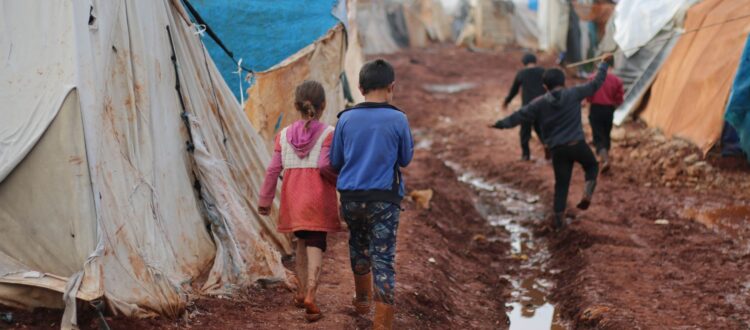LOSS AND DAMAGE: THE CRISIS THAT WE DID NOT WANT, BUT WE COULD HAVE EXPECTED
- The text prepared for COP28 betrays the expectations of vulnerable countries on the new Loss and Damage Fund.
- Developed countries seem to be retreating from their international obligations.
- Civil society raises the alarm: this text moves away from the goal.
In 2022, COP27 ended with a major political victory for developing countries, given the historic decision to establish a Loss and Damage Fund to channel new financial resources from richer to developing countries, in order to face the adverse effects of climate change.
The decision of setting up a Transitional Committee was also reached: made up of 24 members, 14 from Developing Countries and 10 from Developed Countries, its task was to draw up a plan for the operationalisation of the Fund and make recommendations to the leaders of the States at COP28.
The Transitional Commission worked assiduously throughout the year, involving members of civil society too, who were invited to submit their proposals. And yet, the text concluded on the night of November, 3rd-4th was disappointing in many respects, according to many civil society organisations.
Let us start by saying that no one certainly expected the negotiations to be a cakewalk. Certainly, however, the extraordinary nature of the decision reached at COP27 had raised hopes for a perhaps less turbulent process. Instead, despite generous concessions by the developing countries, the final draft text – in the end presented as a ‘take it or leave it’ package, due to the difficulties in reaching an agreement between the countries – contained language that leaves open legal and responsibility questions. The text was considered as ‘volte-face’ to the demands for climate justice that in recent months have been made by civil society, the communities most affected by the climate crisis and developing countries.
WHAT DOES NOT WORK AND WHY?
There are five problematic points.
- There is no explicit reference to the principle of ‘common but differentiated responsibilities and respective capabilities’ (Article 3(1) UNFCCC), a pivotal principle of climate justice that addresses the allocation of responsibilities and redistribution of resources needed to tackle climate change.
- There are no obligations requiring states to make an actual financial contribution, instead sealing the voluntary nature of participation. The text uses terms such as ‘solicit’ or ‘encourage’ developed countries to provide financial support, instead of ‘oblige’ them to participate in the fund.
- The Fund is expected to be temporarily handled by the World Bank for four years (a test period), without indicating an exit strategy though. This is one of the hottest topics considering the historically not idyllic relations between the developing world and the World Bank, from the issue of debt to that of the organisation’s lack of transparency, to doubts about the actual sustainability of many of its projects.
- The scale of the commitment is not defined. The text does not specify any specific ‘figure’ to be paid into the fund, nor does it indicate the type of financial resources that can be used: it refers to a generic ‘wide variety of financing resources’ including mortgages and insurance, instead of sanctioning the use of more equitable redistribution instruments such as taxes, levies or non-repayable loans.
- There is no mention of human rights with reference to the ‘Governing Instrument’ (Annex I) that establishes the objectives, the material scope of operation of the Fund and its internal organs, in particular the Board. However, human rights are the other pillar of climate justice that enables an approach to climate change that puts people, their rights and the reduction of basic systemic inequalities at the centre.
The possibility of the Fund achieving its hoped-for goals were undermined by the rich countries, led by the United States, which opposed from the outset the idea that developed countries would be held financially accountable for their historical responsibility in causing climate change. In particular, US delegate Chan stated that such language would prevent any kind of agreement being reached, insisting on purposefully non-binding vocabulary. Even the proposal for the Fund to be hosted by the World Bank was formulated by the US with the support of the European Union, i.e. precisely those who seem to be among the biggest beneficiaries of its dubious operation.
In addition to this there is the issue of the failure to reach a real consensus on the text, raised by the US delegate just after the text was adopted.
Power plays, then, are once again highlighting the fragility of the UN’s internal decision-making process on politically divisive issues; in this case the positions of the rich countries prevailed in the decisions, opening a crisis that at the eve of COP28 was not needed but could have been foreseen. It is, in fact, rooted in something deeper: different visions of the system and of the future. The specific issue refers to the broader scenario that we observe every year during the negotiations, where one side proposes a fairer and more equitable world, aiming at eco-friendly development, and the other prioritises entrenched interests (economic and fossil), and thus maintains a status quo from which to benefit. Not even the EU’s recent announcement that it intends to contribute financially to the Fund in a very substantial way – although this can only be welcomed – changes what has been written, as we do not believe it can be interpreted as a willingness on the part of the EU to totally revise its position on the Fund and the issue of loss and damage in a substantial way, just a few months before the elections for the renewal of political positions in Brussels.
Erika Moranduzzo, Coordinator of the ‘Rights and Climate’ Section

